Chancellor Daniel Diermeier lauded Vanderbilt faculty’s accomplishments and deep commitment to radical collaboration in his remarks at Spring Faculty Assembly April 28.
“Our faculty today is our most distinguished and accomplished ever,” Diermeier said. “In the next few years, we will continue to invest in and champion your work, to support your research and teaching, and to continue to establish Vanderbilt as a leading center of discovery for multiple fields.”
“Know that your university honors—and is honored by—all that you do. Vanderbilt is here to support you and clear the way so that you can succeed at the highest level,” he said. “I hope you feel, as I do, that there is no better moment than this one to be part of Vanderbilt’s considerable history. I hope you agree that the possibilities here have never been greater, our strengths never more numerous—and the need for our work never more urgent.”
Diermeier cited community as one of Vanderbilt’s most defining characteristics, stressing that community “does not equal consensus.”
“Vanderbilt’s campus must be a proving ground where ideas can be tested and prevailing thought challenged because diverse perspectives form the rich soil from which insight and impact grow,” he said. “This is why at Vanderbilt we embrace a long tradition of making campus a place where open discourse and free expression thrive.”
Diermeier discussed how an important way the university fosters free expression and diversity of thought is by maintaining a position of principled neutrality on political and social matters.
“When a university takes any position—when it sends a signal that one point of view is preferable over another—it creates a climate inconsistent with its purpose, which is not to settle debates, but to foster an atmosphere where students and faculty are free to explore and discuss difficult and complex issues,” he said.
Faculty Senate Chair Mark Magnuson also addressed the faculty and shared an overview of the senate’s goals and accomplishments over the past year, including discussions on topics such as research and creative expression and the role of faculty in shared governance at Vanderbilt.
“Many of you might wonder, as all thoughtful and concerned faculty do, ‘Was there progress addressing the issues that broadly concern many of us?’ My answer to that is a definitive yes,” said Magnuson, Louise B. McGavock Professor and professor of molecular physiology and biophysics. “Our regular meetings between the executive committee, the chancellor, the provost and other key administrative leaders were open and honest, and we began discussing some of our longer-term challenges. I believe we are well-situated to make additional progress in the fall.”
FACULTY AWARDS
Diermeier awarded some of the university’s highest faculty honors at the assembly. The awards recognize excellence in teaching, research, service, leadership and other contributions to the university. Award recipients included:
- Madison Sarratt Prize for Excellence in Undergraduate Teaching
Elizabeth Zechmeister, Cornelius Vanderbilt Professor of Political Science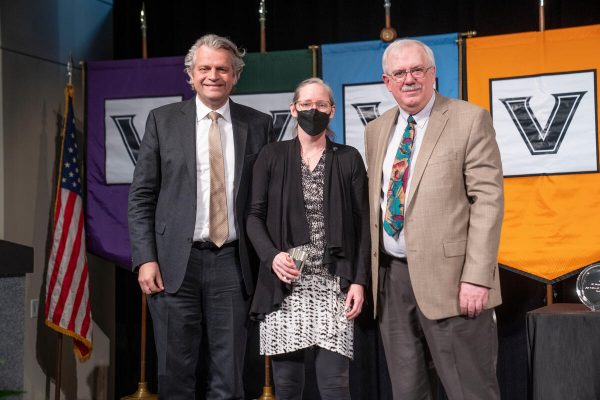
Chancellor Diermeier; Elizabeth Zechmeister, Cornelius Vanderbilt Professor of Political Science; and Faculty Senate Chair Mark Magnuson - Ellen Gregg Ingalls Award for Excellence in Classroom Teaching
Holly Tucker, Mellon Foundation Professor of the Humanities and professor of French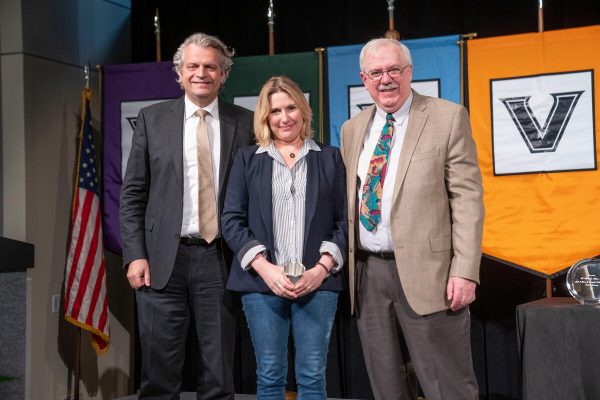
Chancellor Daniel Diermeier; Holly Tucker, Mellon Foundation Professor of the Humanities and professor of French; and Faculty Senate Chair Mark Magnuson. - Harvie Branscomb Distinguished Professor Award
Jennifer Pietenpol, Benjamin F. Byrd Jr. Professor of Oncology and professor of biochemistry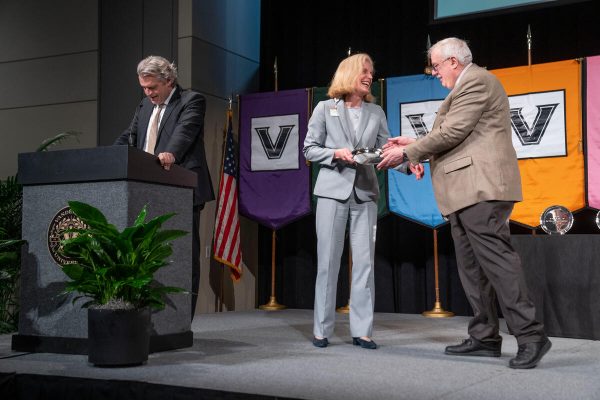
Jennifer Pietenpol, Benjamin F. Byrd Jr. Professor of Oncology and professor of biochemistry, receives the Harvie Branscomb Distinguished Professor Award. - Alexander Heard Distinguished Service Professor Award
Jonathan Gilligan, associate professor of Earth and environmental sciences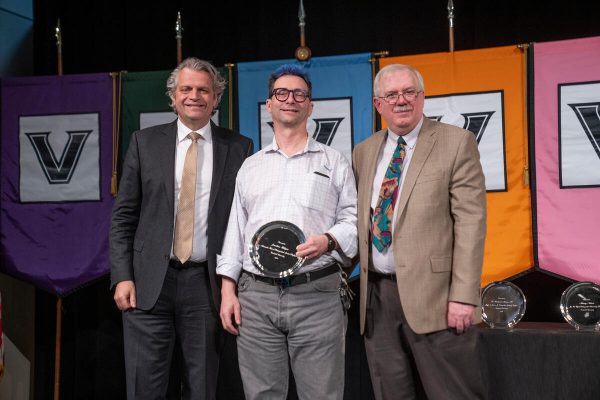
Chancellor Diermeier; Jonathan Gilligan, associate professor of Earth and environmental sciences; and Faculty Senate Chair Mark Magnuson - Joe B. Wyatt Distinguished University Professor Award
Maury Nation, Bob Innes Professor of Human and Organizational Development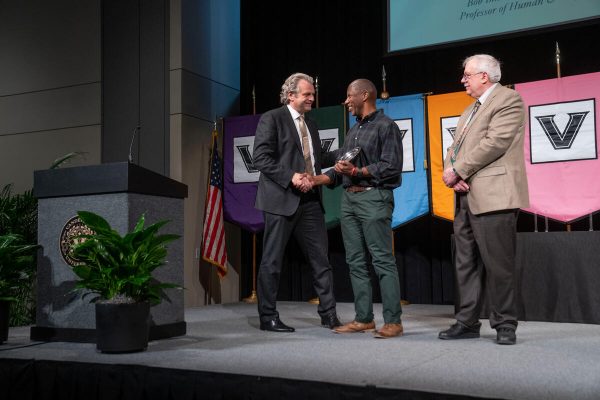
Maury Nation, Bob Innes Professor of Human and Organizational Development, receives the Joe B. Wyatt Distinguished University Professor Award. - Joseph A. Johnson, Jr. Distinguished Leadership Professor Award
Rich Milner, Cornelius Vanderbilt Professor of Education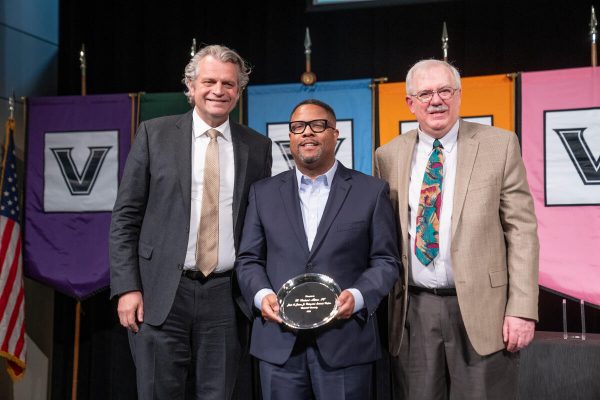
Chancellor Diermeier; H. Rich Milner, Cornelius Vanderbilt Professor of Education; and Faculty Senate Chair Mark Magnuson
Students submitted more than 800 nominations for the Sarratt Prize and Ingalls Awards, with 350 faculty members receiving at least one nomination. Members of the faculty submit nominations to the Faculty Senate for the other awards. The Faculty Senate Consultative Committee reviews the nominations and makes recommendations to university leadership.




